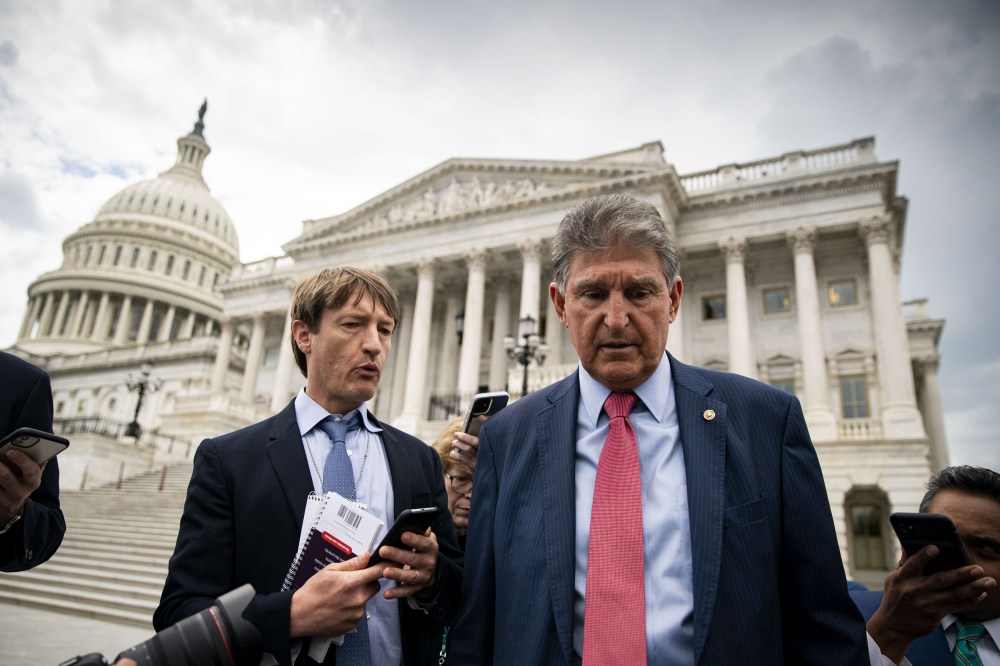How do you solve a problem like Joe Manchin? This is the question angry Democrats have been asking themselves ever since the senator from West Virginia said it was time to take a “strategic pause” on plans to pass a $3.5 trillion budget reconciliation package.
Manchin is the rarest of lawmakers — he’s a Democratic senator in a state won by former President Donald Trump.
The answer, unfortunately, is not much; there is little Democrats can do to persuade, pressure or punish Manchin. But that doesn’t mean Manchin holds all the cards. There’s only so far he can push back against the rest of the Democratic Party without harming himself.
Manchin is the rarest of lawmakers — he’s a Democratic senator in a state won by former President Donald Trump. There are only two other such Democrats — Sherrod Brown of Ohio, who remains an unabashed liberal and a successful Democratic candidate in a red state, and Jon Tester, whose Montana-style populism has kept him in office for three terms. All three have succeeded in hostile political environments because of the power of their political brands.

Manchin, however, is in a more complicated political situation — for both him and his party. He’s a Democrat (albeit a conservative one) in one of the reddest states in the country. He won re-election in 2018 by a mere 3 points and is likely to face a much more difficult fight if he seeks re-election in 2024. It’s unlikely that any other Democrat in the world could win statewide election in West Virginia.
Unlike those of Brown and Tester, Manchin’s persona is that of a conservative Democrat who straddles the two parties, in part by refusing to fall in line with the liberal members of his party. Cultivating an aura of moderation and independence is key to his political survival — and it clearly works. For years, he has persuaded Republican-leaning voters in West Virginia to continue voting for him. But it’s not just a show: This is the way Manchin has approached politics for his entire career.
After all, this is a guy who, when he ran for the Senate in 2010, touted his support from the National Rifle Association as he shot a bullet into a copy of cap and trade, the climate change bill that had passed in the House.
If Biden and the Democrats lose, so too does Manchin.
So every time a liberal activist gets angry at Manchin and calls for him to be stripped of his committee chairmanships or demands that Majority Leader Chuck Schumer or even President Joe Biden try to bend him to their will, it’s music to Manchin’s ears. What better way to stake out his independence, in a state that voted for Trump last year by 69 percent to 30 percent, than to make liberals see red?
What makes it even more difficult to pressure Manchin is that he has an out: He could walk away and join the Republican Party. With his one vote, he can decide whether Biden is a successful president or a failed one.
But that’s also why there are definite limits to how far Manchin can push the edge of the envelope. Manchin has long made his allegiance to the Democratic Party clear, and even if he switched political sides in West Virginia, there’s little guarantee it would help him. He would be likely to lose the support of Democrats and probably get primaried by a more conservative Republican. After all, he has staked his reputation on his independence, not his conservative bona fides.

If Biden and the Democrats lose, so, too, does Manchin. His leverage and his power within the Senate would disappear — along with his chairmanship of the Energy and Natural Resources Committee.
So Manchin can be a stick in the mud, but he can’t torpedo the Democrats’ legislative agenda or fatally undermine Biden’s presidency. To do so would fatally damage his own political fortunes.












